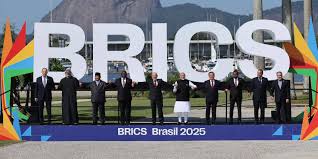
Breaking News
 Trump Throws Support Behind RINO and Warmonger Lindsey Graham's Reelection Bid
Trump Throws Support Behind RINO and Warmonger Lindsey Graham's Reelection Bid
 Pentagon Invests in Sole Operational Rare Earth Mine in the United States – Becomes Largest Invest
Pentagon Invests in Sole Operational Rare Earth Mine in the United States – Becomes Largest Invest
 What Is The 'Canary Mission' And Why Are US Officials Using It To Attack The First Amendment
What Is The 'Canary Mission' And Why Are US Officials Using It To Attack The First Amendment
 Democrats Move to Sanction El Salvador For 'Gross Violations' of Human Rights...
Democrats Move to Sanction El Salvador For 'Gross Violations' of Human Rights...
Top Tech News
 Insulator Becomes Conducting Semiconductor And Could Make Superelastic Silicone Solar Panels
Insulator Becomes Conducting Semiconductor And Could Make Superelastic Silicone Solar Panels
 Slate Truck's Under $20,000 Price Tag Just Became A Political Casualty
Slate Truck's Under $20,000 Price Tag Just Became A Political Casualty
 Wisdom Teeth Contain Unique Stem Cell That Can Form Cartilage, Neurons, and Heart Tissue
Wisdom Teeth Contain Unique Stem Cell That Can Form Cartilage, Neurons, and Heart Tissue
 Hay fever breakthrough: 'Molecular shield' blocks allergy trigger at the site
Hay fever breakthrough: 'Molecular shield' blocks allergy trigger at the site
 AI Getting Better at Medical Diagnosis
AI Getting Better at Medical Diagnosis
 Tesla Starting Integration of XAI Grok With Cars in Week or So
Tesla Starting Integration of XAI Grok With Cars in Week or So
 Bifacial Solar Panels: Everything You NEED to Know Before You Buy
Bifacial Solar Panels: Everything You NEED to Know Before You Buy
 INVASION of the TOXIC FOOD DYES:
INVASION of the TOXIC FOOD DYES:
 Let's Test a Mr Robot Attack on the New Thunderbird for Mobile
Let's Test a Mr Robot Attack on the New Thunderbird for Mobile
 Facial Recognition - Another Expanding Wolf in Sheep's Clothing Technology
Facial Recognition - Another Expanding Wolf in Sheep's Clothing Technology
Rio summit made clear BRICS is sliding towards irrelevance

The BRICS group of nations has just concluded its 17th annual summit in the Brazilian city of Rio de Janeiro. But, despite member states adopting a long list of commitments covering global governance, finance, health, AI and climate change, the summit was a lackluster affair.
The two most prominent leaders from the group's founding members – Brazil, Russia, India, China and South Africa – were conspicuously absent. One was Russia's president, Vladimir Putin, who attended only virtually due to an outstanding arrest warrant issued by the International Criminal Court over his role in the war in Ukraine.
China's Xi Jinping avoided the summit altogether for unknown reasons, sending his prime minister, Li Qiang, instead. This was Xi's first no-show at a BRICS summit, with the snub prompting suggestions that Beijing's enthusiasm for the group as part of an emerging new world order is in decline.
Perhaps the most notable takeaway from the summit was a statement that came not from the BRICS nations but the US. As BRICS leaders gathered in Rio, the US president, Donald Trump, warned on social media: "Any Country aligning themselves with the Anti-American policies of BRICS, will be charged an ADDITIONAL 10% Tariff. There will be no exceptions to this policy."
Trump has long been critical of BRICS. This is largely because the group has consistently floated the idea of adopting a common currency to challenge the dominance of the US dollar in international trade.
Such a move makes sense if we focus on trade figures. In 2024, the value of trade among the BRICS nations was around US$5 trillion, accounting for approximately 22% of global exports. Member nations have always felt their economic potential could be fully realized if they were not reliant upon the US dollar as their common currency of trade.
During their 2024 summit, which was held in the Russian city of Kazan, the BRICS nations entered into serious discussions around creating a gold-backed currency. At a time when the Trump administration is waging a global trade war, the emergence of an alternative to the US dollar would be a very serious pushback against US economic hegemony.
But the freshly concluded BRICS summit did not present any concrete move towards achieving that objective. In fact, the 31-page Rio de Janeiro joint declaration even contained some reassurances about the global importance of the US dollar.



